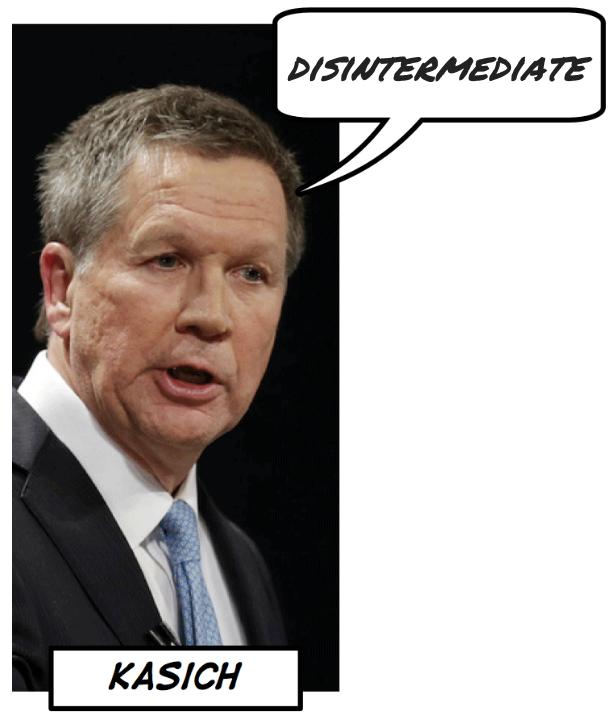Dept. of Word Lists
The Linguisticky Highs and Language Lows of Last Night's Debate

The Republican debate on CNBC was billed as a discussion of the financial issues facing the nation, but it turned into something much livelier than that description might suggest: a raucous two hours.
Candidates interrupted each other and asked for rule clarifications, rebelling against and refusing to answer moderator questions — questions which were often greeted by a loud chorus of audience boos. Continuing our coverage of relevant words in the debate season, we've prepared a list of the top ten most relevant words heard last night; below are a few linguistic highs (and lows) from the contest.
The highest high came late in the debate when Governor John Kasich pulled disintermediate out of his lexical back pocket.
"And, of course, we need to take advantage of on-line education to reduce these costs and begin to disintermediate the cost of four years."
Kasich was speaking to a question about student debt and education, using disintermediate to suggest that online classes can cut down on what stands between an individual student and a degree.
Although disintermediate sounds as if it was made up on the spot or the result of a speaker changing his mind mid-word, it is in fact, a word. A related term, disintermediation, is well-established in economics where it's used to describe a step in a supply chain being eliminated (one less intermediary), and this may very well be where Kasich got the term. Like nonplussed and counterinsurgency, however, disintermediation wears its confusion on its sleeve, making the listener pause to see if they understand correctly.

Senator Marco Rubio, considered by many analysts to have advanced his standing through his performance in the debate, wins points in our book for his use of demagogue.
"And on this issue of the Medicare in particular, it's important because they're going to demagogue what we're saying here tonight."
While not a particularly common word, demagogue, which is defined "as one who appeals to popular desires and prejudices instead of using rational arguments," arises in political circles and during campaigns as an insult on a fairly regular basis. What made Rubio's use so interesting is that he used demagogue as a verb, or as linguists might say, he denominalized it. Rubio clearly means here that "they" (the opposition) are going to turn us into demagogues, but he used the uncommon verb where the more common demonize might be expected. Of Greek origin, demagogue the noun was first attested in English in the 1640s, but no one used it as a verb until 1964, and verbal uses are still very rare.

Senator Ted Cruz brought out a term from history when he said:
"The second thing we need to do is I think we need to bring together a bipartisan commission to look at getting back to rules-based monetary policy, end this star chamber that has been engaging in this incredible experiment of quantitative easing, QE1, QE2, QE3, QE- infinity."
Although a star chamber is now associated with secrecy and shady dealings, the original star chambers were set up in 15th-century England to ensure that the rich and powerful were not allowed to influence the courts unfairly. Thanks to the star chamber practices such as witnesses being questioned in secret rather than in open court, these proceedings eventually became a symbol of judicial corruption. Cruz has used the term both at the debate and on the campaign trail to protest the secrecy of the Federal Reserve.

Carly Fiorina used the term crony capitalism and then went on to helpfully define what it means. Sort of.
"What's crony capitalism? Crony capitalism is what happens when government gets so big and so powerful that only the big and the powerful can handle it."
If you're taking the SATs anytime soon, you might want to supplement Fiorina's definition of cronyism with "the hiring of friends to important positions, regardless of ability." Derived from the Greek khronios, "long-lasting," it's related to other words having to do with time like chronology and chronological. For more on crony capitalism and its near-universality, see this great William Safire column.

With the exception of the A+ braggadocious Donald Trump trotted out for the second Republican debate, his plain-speaking, businessman's style eschews unusual or highly specific words. But last night, he reached deep into his personal lexicon, using catastrophe twice, and calling Atlantic City "a disaster."
"We lose with one of the worst deals I've ever seen negotiated of any kind, that's our recent catastrophe with Iran.…I think gun-free zones are a catastrophe. They're a feeding frenzy for sick people."
Both disaster and catastrophe have interesting etymologies. The ast- in disaster comes from astro-, the root concerned with the heavens and the stars, as in astronomy. The original sense of disaster was something fated by the stars and planets not to be or to go badly. Catastrophe originally meant "a reversal of what is expected, a downturn." The Greek element in the word which means "turn," strephein, is also present in apostrophe, because in addition to the familiar punctuation mark, the Greeks used apostrophe to indicate a speaker's "turning away" from the crowd to address some individual, engaging in an aside.
Want to see more words from this debate? Check out our vocabulary list "Top Ten Most Relevant Words from the Third Republican Debate, October 28, 2015," created using our list building tool and relevance data derived from our 3.2 billion-word corpus.


